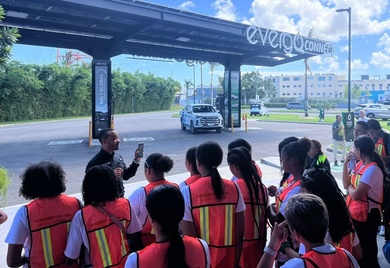Is Investment in Palm Oil Certification Worth It?

[caption id="attachment_2604" align="alignleft" width="266"] Palm oil plantation in Ecuador[/caption]
Palm oil plantation in Ecuador[/caption]
On the other hand, simply vilifying palm oil and the people who produce it fails to recognize the crop’s benefits. There is a reason that palm oil has expanded so rapidly: it’s profitable and productive. Compared to other oil producing crops, like soy, coconut, and sunflower seed, palm oil produces three to ten times the amount of oil. Because of its productivity, palm oil is cheaper than other oils and is therefore found in many consumer products. If we banned palm oil, but continued our oil consumption trends, we’d need to use a lot more area to produce the same amount of oil. Plus, palm oil production is critical to national and local economies; many small farmers’ livelihoods depend on the crop.
Given recent palm oil growth in Latin America and the Caribbean, we as a development bank are evaluating palm oil’s varied impacts on the region. Colombia, for example, is already the fifth largest palm oil producer in the world and plans to increase production six fold by 2020. The Honduran government is supporting an increase of more than 100,000 hectares of planted palm oil. Can the Latin American region benefit from palm oil while avoiding the devastating impacts experienced by Southeast Asia?
In 2004, The Roundtable on Sustainable Palm Oil was created to make palm oil production more sustainable; continuing its harvest while reducing negative environmental and social impacts. Any palm oil that is certified under RSPO should meet RSPO’s principles and criteria, which include environmental and social indicators. For example, RSPO certified companies may not clear forests with “high conservation values.”
However, RSPO still has a number of issues to sort out. On the business side, supply of RSPO certified palm oil is greater than demand, meaning that the premium paid for RSPO certified palm oil is low – about 2.3% higher than non-certified palm oil. As long as consumers don’t differentiate between RSPO and non-RSPO palm oil certified products, the price premium will remain low. The low return on the investment of certification discourages producers from pursuing RSPO; 20% of global palm oil supply is RSPO certified.
Another critique of RSPO comes from environmental and social advocates, who claim that RSPO members continue to act irresponsibly. RSPO principles and criteria only protect old growth forests and forests with high conservation value, meaning that secondary forests and peatlands are fair game for conversion to palm oil plantations. Moreover, a number of RSPO members are responsible for deforestation of forests that should have been protected, calling into question the ability of RSPO to police its members.
[caption id="attachment_2603" align="alignright" width="346"] Palm oil producer[/caption]
Palm oil producer[/caption]
For these reasons and more, there is an ongoing debate about whether RSPO is the best means of reducing palm oil’s negative impacts.
Seeking to answer these questions, the IDB has partnered with an innovative palm oil processing company in Ecuador, La Fabril. La Fabril has committed to achieving RSPO certification – which includes certifying hundreds of its small-scale, independent suppliers. We’ll look at the business case for La Fabril to become RSPO certified in order to better understand companies’ motivations. Our study will also consider the environmental and social impacts of RSPO certification.
Given the explosion of palm oil in our region and the checkered history of the crop elsewhere, it’s critical not to repeat the same mistakes. Is RSPO an effective mechanism to clean up palm oil in Latin America and the Caribbean?
LIKE WHAT YOU JUST READ?
Subscribe to our mailing list to stay informed on the latest IDB Invest news, blog posts, upcoming events, and to learn more about specific areas of interest.
Subscribe



